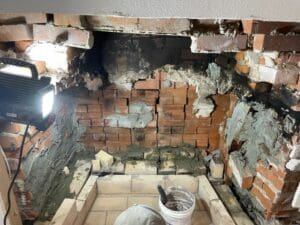
Why Outdated Fireplaces Lower Home Value
For many homeowners in the Houston area, a fireplace is the heart of the home. It is a focal point for holiday gatherings, a source
When a cozy fire crackles in the living room, you rarely think about the small metal valve tucked just above the flames. Yet that fireplace damper quietly determines whether heat stays inside, smoke leaves efficiently, and drafts never sneak back in. In Houston’s subtropical climate, high humidity, sudden downpours, and airborne pollen give dampers a workout all year. Rust, warped frames, and stuck handles aren’t just annoyances—they can spike energy bills, make lighting a fire a smoky chore, and even let dangerous carbon monoxide seep indoors. This localized guide breaks down why timely damper repair matters, the common problems facing Houston homeowners, and how Texas Chimney LLC approaches every fix with precision. Whether you burn wood on crisp winter evenings or rely on a gas log set for ambience, keeping that damper in peak condition protects both comfort and safety while preserving the charm of your heart.
A damper is a movable plate—usually cast iron or steel—installed just above the firebox. Flip the handle open, and smoke wafts smoothly up the flue; close it, and conditioned air stays where it belongs instead of vanishing skyward. Because Houston homes rely on HVAC systems almost year-round, a leaky damper can translate into jaw-dropping energy bills as cooled air escapes in summer and warm air flees during the occasional cold snap. Neglect it long enough, and you’ll be shelling out for full-blown chimney repair instead of a quick tune-up. Worse, a defective seal creates negative pressure that pulls soot-laden air back into living spaces, staining walls and aggravating allergies already triggered by Houston’s high pollen counts. Early warning signs include a persistent campfire odor, visible daylight around the damper edge, or a handle that refuses to budge. Addressing these issues promptly prevents corrosion from spreading to other chimney components and keeps the firebox draft balanced. Regular inspections by Texas Chimney LLC catch small defects before they morph into costly rebuilds, ensuring your fireplace remains an asset—not a liability—to household comfort.
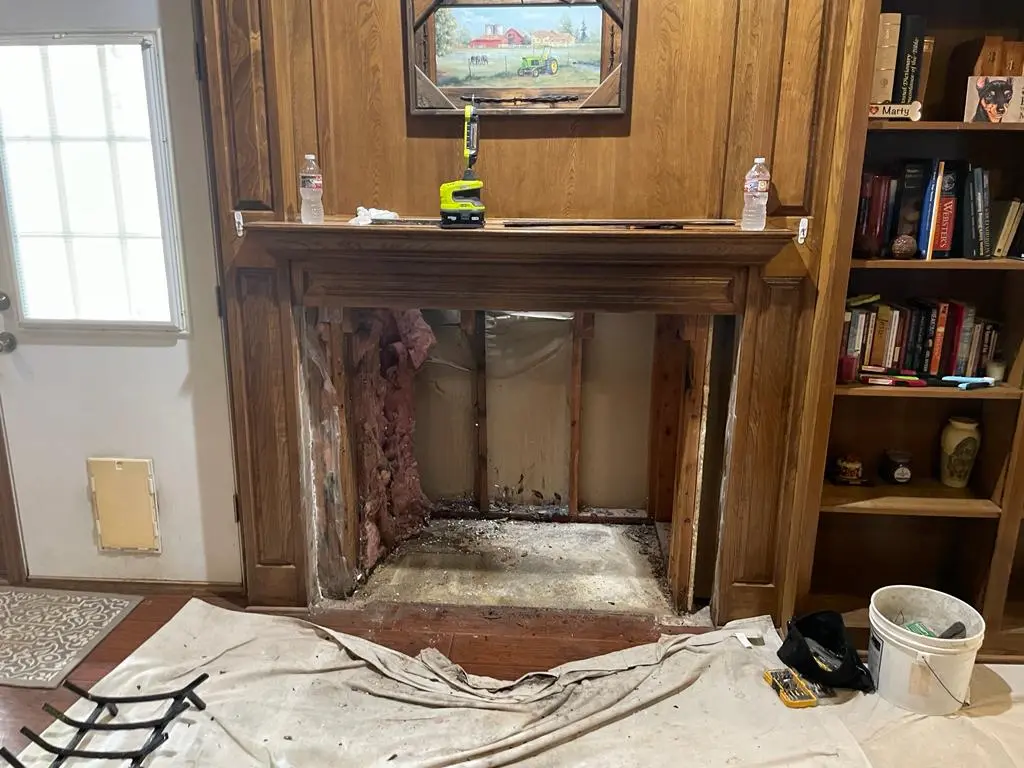
Trusted by 5k+ satisfied customers
143 Reviews
Needed chimney repair new gas logs and fire place screen. Willie did an excellent job. Very professional. Will definitely use again and recommend to my friends.
Lis Ham
75 Reviews
Texas Chimney refurbished my gas fireplace, converted a wood burning to gas, and fix the chimney. Excellent work by the project manager Eli and the entire team.
Kayla N.
77 Reviews
Went beyond the normal service and ensured my gas fireplace was fixed and working correctly. He even came out a second time on Christmas Eve! I would hire again and again.
Rodd K.
A+ Rating
Texas Chimney replaced chase pan and cap, repaired damaged brick, repointed mortar joints, and recaulked flashing, etc. Professional job, fair price, conscientious owner and crew.
Joe F.
Humidity is the silent saboteur of fireplace hardware. With dew points that routinely hover above 70°F, Houston air is saturated enough to condense inside a cooling chimney after each burn. Moisture mixes with acidic creosote deposits, accelerating rust on metal surfaces and warping cast-iron frames. Over time, the damper blade may swell against the throat walls, making operation stiff or impossible. Hurricanes and tropical storms common to Houston can also blow water straight down un-capped flues, soaking damper assemblies and the brickwork below. Left unchecked, corrosion flakes drop onto the smoke shelf, obstructing draft and forcing smoke into the room. Texas Chimney LLC combats these climate pressures by applying high-temperature anti-rust coatings, replacing worn hardware with stainless components, and recommending custom-fit dampers that seal tighter against humidity ingress. A simple annual check each fall saves homeowners from mid-season surprises and extends the life of both masonry and metalwork by years.

Free Inspection 7 Days A Week
Top-Rated Chimney Sweeping
100% Customer Satisfaction
Same Day Services

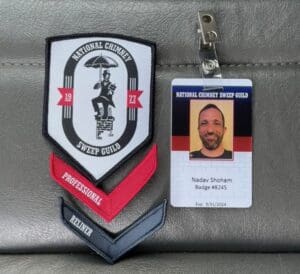
Nadav Shoham - chimney professional
Hello, Houston! 🏠
Welcome to Texas Chimney LLC, the heart of chimney care in the Lone Star State. For over 14 years, we’ve been keeping the hearths of Houston homes burning brightly and safely. As proud members of the Texas National Chimney Sweep Association and with our CSIA-certified professionals on board, we’ve blended time-honored techniques with contemporary knowledge to provide top-notch service. But don’t just take our word for it—our hundreds of 5-star reviews on Google, Yelp, HomeAdvisor, and Facebook speak volumes about our commitment to excellence. Trust in our legacy, and let us serve you with the warmth and expertise that Houston has come to love!
DIY tutorials might make damper repair look easy, but they rarely account for chimney height, complex linkage systems, or the specialized tools needed to seat a blade flush against uneven masonry. Certified sweeps at Texas Chimney LLC undergo rigorous training specific to Houston building codes and regional fire-safety standards, ensuring every repair meets both local regulations and manufacturer specs. First, technicians perform a camera-assisted inspection to locate cracks, rust pockets, or misalignments that aren’t visible from the hearth. Next comes precision grinding or part replacement—often with energy-saving top-mount dampers that double as rain caps, a popular upgrade among sustainability-minded Houston households. Finally, every job concludes with a smoke-draw test and written report, so you know exactly how the system now performs. Choosing seasoned pros means zero guesswork, warranty-backed workmanship, and peace of mind that your family can enjoy a fire without hidden hazards.


A newly repaired damper still needs consistent care to stay trouble-free. Start by opening it fully before every burn—a simple habit that prevents soot from accumulating on the sealing edge. After fires die out, allow the chimney to cool, then close the damper to keep Houston’s humid air from condensing on masonry and metal. Schedule an annual sweep before the first cool front rolls through Houston, even if you burned only a handful of logs; fine creosote particles absorb moisture like a sponge and foster corrosion. Between professional visits, vacuum loose ashes from the smoke shelf using a shop-vac fitted with a HEPA filter, and give the handle a gentle flex monthly to confirm it still moves freely. A dab of high-temperature lubricant on pivot points each spring wards off rust in the long, muggy off-season. These small steps, combined with expert inspections from Texas Chimney LLC, keep drafts under control and your fireplace ready for that first crackling flame of the season.
Recognizing the warning signs early can prevent bigger (and more expensive) problems. If your fireplace feels drafty, fills the room with smoke, or is difficult to start, your damper may be damaged. Look out for rust, corrosion, or if it’s hard to open or close—those are clear red flags it’s time for a repair.
Dampers don’t just break out of nowhere. The most common issues are rust and moisture buildup—especially if your chimney isn’t properly maintained. Over time, parts can also wear down or get misaligned, preventing the damper from sealing properly or moving smoothly.
Dampers don’t just break out of nowhere. The most common issues are rust and moisture buildup especially if your chimney isn’t properly maintained. Over time, parts can also wear down or get misaligned, preventing the damper from sealing properly or moving smoothly.
It’s tempting to try but not worth the risk. DIY fixes often miss deeper issues and can lead to bigger problems later. A trained pro has the tools and experience to handle it safely, ensuring your fireplace runs efficiently without compromising your home’s safety.

For many homeowners in the Houston area, a fireplace is the heart of the home. It is a focal point for holiday gatherings, a source
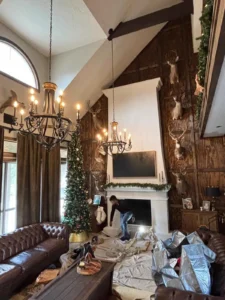
Wood-burning stoves are a favorite among Houston homeowners who value self-sufficiency, high-efficiency heating, and the unmatched ambiance of a real fire. Unlike traditional open fireplaces,
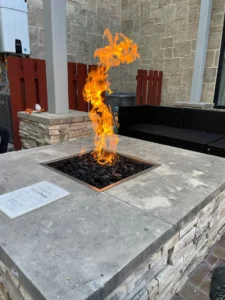
In the competitive Houston real estate market, homeowners are constantly seeking ways to distinguish their properties from the rest. While interior upgrades like kitchen remodels
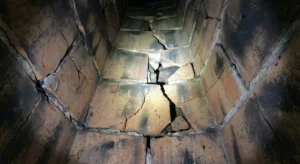
For many homeowners in Texas, an older home carries a unique charm, architectural character, history, and often, a beautiful masonry fireplace. However, beneath the classic
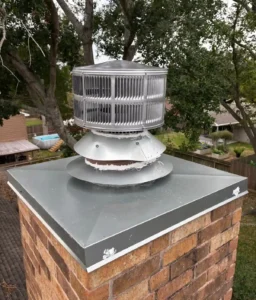
In the diverse climate of Texas, where a week of scorching sun can be followed by a torrential downpour or a sudden freeze, the structural
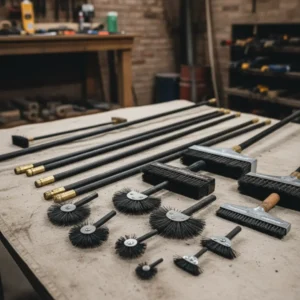
A crackling fireplace is the hallmark of a cozy home, but the beauty of a fire comes with the responsibility of maintenance. Behind the scenes,